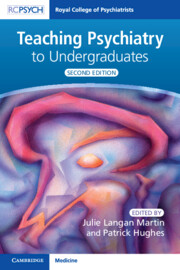Book contents
- Teaching Psychiatry to Undergraduates
- Teaching Psychiatry to Undergraduates
- Copyright page
- Contents
- Contributors
- Section 1 Principles of Medical Education
- Section 2 The Undergraduate Psychiatry Curriculum: Planning and Delivery
- Section 3 Clinical Placements in Psychiatry
- Section 4 Formal Teaching
- Section 5 Materials Development
- Section 6 Gathering feedback and quality improvement
- Section 7 Student Welfare
- Section 8 Developing as a medical educator
- Chapter 8.1 Getting Involved
- Chapter 8.2 Formal Roles in Medical Education
- Chapter 8.3 Training in Medical Education
- Index
- References
Chapter 8.1 - Getting Involved
from Section 8 - Developing as a medical educator
Published online by Cambridge University Press: 12 October 2022
- Teaching Psychiatry to Undergraduates
- Teaching Psychiatry to Undergraduates
- Copyright page
- Contents
- Contributors
- Section 1 Principles of Medical Education
- Section 2 The Undergraduate Psychiatry Curriculum: Planning and Delivery
- Section 3 Clinical Placements in Psychiatry
- Section 4 Formal Teaching
- Section 5 Materials Development
- Section 6 Gathering feedback and quality improvement
- Section 7 Student Welfare
- Section 8 Developing as a medical educator
- Chapter 8.1 Getting Involved
- Chapter 8.2 Formal Roles in Medical Education
- Chapter 8.3 Training in Medical Education
- Index
- References
Summary
Psychiatry trainees play an important part in undergraduate medical student teaching. This chapter will explore some of the potential reasons why trainees should consider getting involved in teaching. Some of the opportunities for trainees to get involved in teaching are outlined and a number of teaching opportunities beyond the undergraduate setting are explored.
- Type
- Chapter
- Information
- Teaching Psychiatry to Undergraduates , pp. 189 - 194Publisher: Cambridge University PressPrint publication year: 2022



